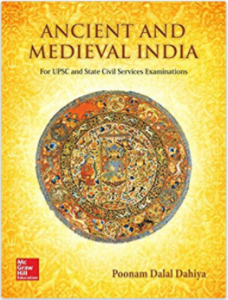On this page, you will get ‘Book Reviews’ of all the important Books that are important part of one’s preparation of Civil Services Examination, UPSC.
The motive is to clear the doubts of a beginner and let him select/choose an appropriate resource without wasting his/her precious time. We will keep on updating this page time to time.
World History Books for UPSC
Mastering Modern World History by Norman Lowe
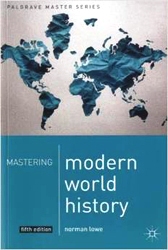
UPSC syllabus includes
History of the world will include events from 18th century such as industrial revolution, world wars, redrawal of national boundaries, colonization, decolonization, political philosophies like communism, capitalism, socialism etc.- their forms and effect on the society.
Except Industrial Revolution, this book covers all the topics in detail and comprehensive manner.
Features of the book
- This book gives you insight about world history starting from First World War to disintegration of USSR.
- Unlike other history books that many a times are boring, this book is divided into multiple events and chapters that are interconnected and easy to comprehend.
- The chapters are beautifully explained in bullet points and every next chapter is explained linking the previous chapters and events. This is important to follow and understand multiple events.
- All the chapters have subjective questions in the end that is linked to various issues discussed in the chapters. This will help you to recollect the points and helps in developing the thought process as some questions are analytical (exactly what UPSC asks)
- The distinct feature of this book is the simplicity of narrating the events in point wise manner along with ‘Thinking Exercise’ at the end of every chapter. Thinking exercise will help you to consolidate all the important events and issues thereby generating opinions and critical thinking.
- The language of the book is very simple and lucid that makes it very comprehensible for a beginner and non-social science background aspirants.
- A must read for them who don’t like to read novel type texts and have difficulty in deciphering the analytical perspective of themes and events.
- Bottom line- A must if you dislike History because this book is going to save you in more than one ways 🙂
History of World from the Late Nineteenth to the Early Twenty-First Century by Arjun Dev and Indira Arjun Dev
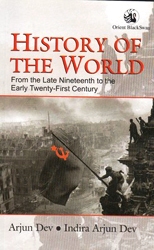
- The book gives insight about World History from 1890 to Non-Alignment Era.
- It is written in a concise manner and a short book to read.
- As far as UPSC syllabus and perspective is concerned, the book does no justice as aspirant will feel disconnected and disoriented after reading every chapter. The reasons are simple, there is no mention of background and it is not written keeping UPSC examination in mind.
- It gives feeling of reading a Novel and for History lovers, this book is a treat to read. As an Aspirant, when time and energy has more value, we would suggest to avoid it if you are studying just to pass this exam. 🙂
- Else, if you have strong liking for History texts and have strong background of related events, this book is really good because of its lucid language and presentation.
- Bottom line– Do not go for this book if you have NCERT’s or Norman Lowe.
INDIA AFTER GANDHI — The History of the World’s Largest Democracy by Ramachandra Guha
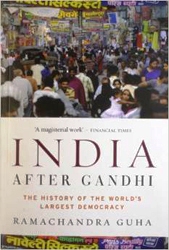
- Written by a renowned Historian of India, the book has been touted as “Ramayana of Indian Democracy”.
- UPSC Syllabus mentions ‘Post-independence consolidation and reorganization within the country’ and this book covers all the significant events of Post-Independent India in a descriptive manner.
- It is a voluminous book that may threaten many of you. At first glance this book will never attract an aspirant howsoever the inside picture gives a contradictory picture.
- Quality and content wise, a treasure to read as an Indian and an aware citizen of India should read it once to understand the major events and historical developments.
- However, as an aspirant, considering the amount of time and energy, even if one ignores it as a regular book, there is no harm.
- If you have patience and passion to read, this book will do wonders to your knowledge. Hence choose according to your capability.
- Bottom line- Not recommended as part of preparation but highly recommended for knowledge base.
Polity Books for UPSC
Indian Polity by Laxmikanth
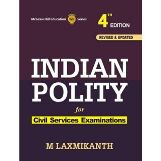 Polity is one of the most important subjects of UPSC syllabus and general awareness. Basically it tells about the political, constitutional and governmental build up of the nation.
Polity is one of the most important subjects of UPSC syllabus and general awareness. Basically it tells about the political, constitutional and governmental build up of the nation.
Coming to the book, “Indian Polity by Laxmikanth”– is the most sought and referred book not only because of its availability but for its impressive coverage and simplicity. It also has the distinction of being the best seller book in this category. It has the edge over other available books in the market in various ways.
Despite Polity being boring subject for many, this book has ousted the boredom by its unique style of presenting and discussing the facts and figures. The language is simple and bullet pointers will ease your mental fatigue to remember enormous articles and constitutional changes.
Important features include-
- The presentation of the Book– The content is divided into various chapters and the uniqueness lies in the connectivity of the concepts. So, you will find it very easy to proceed to next chapter with relative study.
- Almost all required aspect of Indian Polity– The book covers all the minute details and aspects of Indian Polity in comprehensive manner.
- Practice Questions- At the end of the book, you will find previous year questions of UPSC as well as new practice questions based on given chapters and concepts. It will not only act as revision but will also build conceptual clarity.
- Very Easy for non-social science background students– It is seen that aspirants/students from science background find it difficult to start their preparation of subjects like Polity, History and Economics. This book is one stop solution for Polity.
Our Constitution- An Introduction to India’s Constitution and Constitutional Law by Subhash C. Kashyap
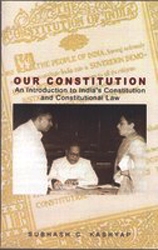
- A very good book to understand Indian Constitution and laws, written by an eminent scholar and political thinker, Subhash C. Kashyap.
- The distinct feature of the book is its writing style and presentation that revolves around interactions and case studies to explain the contexts.
- Unlike other books on Indian Constitution and Polity where direct and objective analysis has been given, this book deals in a subjective and analytical approach to present its contexts. Hence, a stand out book when subjectivity is compared.
- Various case studies and accounts will give you a clear picture of political events that led to specific amendments and law enactment. This will help you remember various cases and events in a precise manner.
- Bottom line– Highly recommended (No to beginners). Even if you dislike reading multiple books, do read it once.
- Beginners- Do read NCERT’s or Laxmikant before jumping to this book.
Our Parliament by Subhash Kashyap
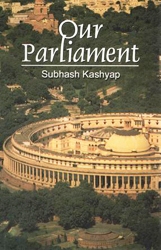
- Another classic book by Subhash Kashyap dedicated to ‘Indian Parliament’.
- Subhash Kashyap was the Secretary General of Parliament and has sound knowledge of the subject. Our Parliament is also very useful for GS Mains as well as for Public Administration paper.
- The book is a descriptive presentation of historical, political, procedural and functional account of Indian Parliamentary System.
- As an aspirant, it will be an overdose for many of you to read whole book only on Parliament itself!!. But if one wants to understand Parliamentary procedures and various historical accounts of working of Indian Parliament, this book will not only suffice your needs but also arouse your interest to further your Political and Constitutional understanding
- Bottom Line– Highly recommended for Political science and Public administration aspirants. If you ask whether for General Studies? We would say, go for it in your leisure time and read it as part of knowledge building exercise. This will help you gathering enough content and fodder for ‘Essay’ as well as develop your opinion and perspective that you may not while reading political articles in the newspapers.
Geography, S&T & Environment Books for UPSC
Geography through Maps

- The book is a compilation of all the relevant information at one place. The aim is to make useful contributions to all those students for whom Geography and knowing places still remains a difficult proposition.
- The maps used are not true to scale but they are meant to guide every reader of this book to locate places and to obtain important information about them. The picture of the whole world has been presented in a sequential manner so that at no point the reader finds it monotonous, dull and uninteresting.
- The book contains an exhaustive glossary to help the students to know about the places in short cut manner. Glossary of locations of the world and India is exhastively incorporated. An appendix is also provided which contains facts and recent data of India and the world-updated till March 2015.
Science, Technology, and Society

Science, Technology, and Society is quite explanatory, more organised, very well structured and written like a text book so that the reader can understand and evince interest in the topic. Taking into account the contemporary theme of UPSC syllabus, which requires the students to be analytical, correlative, and forward looking the book covers:
- the technology its form and function, i.e. what the technology is all about. This is significant for building a base.
- the developments in the technology, which is important for understanding policy implications and intent.
- the impact of technology on the people, that is the application part and its shortfall to give a real picture in India and its implementation problem.
- the impact of technology on society and economy, that is the interdisciplinary part and the academic part.
The book is capable of answering questions from both preliminary examination and mains. It is written and presented in a manner that it will build the basics, answer the applied sections and analyse the applicability part.
The books edition is a year old and it will be wonderful to have an updated edition.
Basic Geography

- The book “Basic Geography”, is an attempt to help clear the concepts of Geography and also help the students understand the content of all the basics one should know about Geography.
- The book explains the concept of geography in a simplified manner. It covers possibly all the topics that Physical Geography, Settlement Geography and Human Geography. The coverage of the topic is wide, comprehensive, and multidimensional presented in a simplified manner.
- The book is intended to be an authentic source for students preparing for Civil Services Examination form where they can answer almost all the questions are asked in GS Preliminary Exam. The book is a compilation and amalgamation of concepts that are strewn all over the world and are found in NCERT, Wikipedia, NBT, Oxford, Bunnet, and Goh Cheng Leong. The book uses a lot of tables and has numerous illustrations. The proportion of text to diagrams is very high which makes it an easy read. There are many colour plates as well that can help in better understanding of concepts.
Ecology and Environment

- Ecology and Environment is an informative book to make useful contributions for a better understanding of the earth.
- From the environmental point of view the book is very informative. It is short, concise, pictorial, and authentic and covers latest global events that took place till first half of 2013.
- It comprises of the latest development related to environment. The coloured plates incorporated in this book is to serve the purpose of better understanding and along with this exhaustive glossary have been given to facilitate the reader.
- The book is intended is written in a textbook form but serves more as a guide for GS preliminary preparation of Ecology and Environment and Biodiversity.
‘Crack Civil Services in First Attempt’
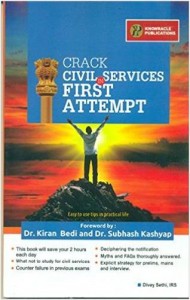
When the idea to prepare for civil services is incepted in the mind of an aspirant he finds several conflicting thoughts bombarding simultaneously. Millions of questions about Civil services regarding the ferocious competition, the probabilities of success and degrees of various risks involved and the best ways of addressing many such concerns baffle the aspirants’ minds.
The game of civil services examination is quite unlike the other all India level examinations such as CAT, IIT JEE, GATE etc where the results are announced within a few months of the date of exam. UPSC civil services exam tests the patience and perseverance of the candidates. But do all patient and hardworking candidates qualify? The answer is no. It is in this competitively fierce scenario that right guidance can be a boon to the candidate and this is exactly what Divey sethi has chalked out in his book CRACK CIVILS SERVICES IN FIRST ATTEMPT.
It might look like a lean version of a UPSC guide but pretty much covers everything that pops up in the mind of the aspirant. The period from 2011-2014 had seen too many changes in the pattern of the exam and was indeed the golden period for some and Sethi has addressed how can one make the best out of this constantly changing style and pattern of the examination. Then the author goes on to cover the most delicate issue of why one should go for civil services and the million dollar question of deciding upon the Optional Subject. He further moves on to the art of smart reading of the newspapers, the role of websites and social media and how far they are to be involved in the study preparations and more importantly in what manner. The author vociferously vouch for ‘smart study’ rather than only doing hard work – which in the present scenario may not lead to the desired end.
Going forward, the author elucidate on the role or rather the menace created by the coaching institutions and the many other sources of getting your General Studies preparation. “UPSC doesn’t want the candidates to be ‘coached’ any longer’, he says, “Guidance is more than sufficient to crack the toughest exam with a little ingredients of inquisitiveness and common sense.” He discusses in detail the content and strategy to deal with all the papers of General Studies which is impressive in a way. More importantly how to develop an eye for relevant detail and to overlook what is unnecessary for the purpose of examination is what that saves a lot of effort and time in this preparation.The detailing of the ethics paper is quite striking. It is fascinating to read the wordplay where he innovates various theories of compartmentalization and the photoelectric effect to explain the various dilemmas an aspirant may face. One of the other good things is that he has incorporated the personal experiences of many other aspirants in his circle, which brings in an element of practicality in this book.
“Rather than teaching every bit in every subject it is best to teach a person how to self-teach himself.” The author has devised time-bound progress charts to make the life of an aspirant easier and a system of self-check for rectification.
Very fascinatingly he has introduced many theories of categorization and has put light to explain the various state of uncertainty, which may be faced by the candidates. Lastly, he had focused on the preparation for the personality tests. The element of pragmatic wisdom and practicality makes the book a worth reading for not only an aspirant but anyone who is curious to know the insights of the civil services examination.
In a nutshell, this book tries to answer all the queries and difficulties which a UPSC candidate may face while preparation, especially if they are freshers. The answer which he has given is very precise and comprised at one place, which reduces the work of the candidates to garner information from diversified sources.
Ancient and Medieval India by Poonam Dalal Rank 308 CSE 2015
